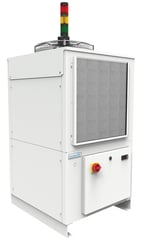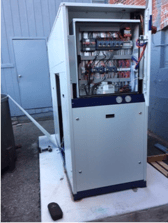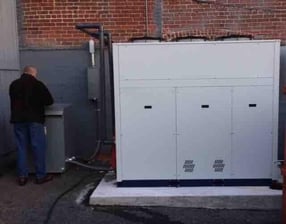Choosing the best chiller for your application is not always as simple as picking a product from a catalog. When sizing a chiller it is important to know the environment it will be in. For example, if you need a 5 ton chiller you have to determine 5 tons at a certain ambient and a certain leaving water temperature. When you change either one of these parameters you change the capacity of a chiller. For instance a 5 ton chiller operating at 65°F leaving water temperature in an ambient of 90°F will become a 4 ton chiller if operating at 50°F leaving water temperature and 90°F ambient. The same holds true for higher ambient. The capacity will be reduced significantly when the ambient increases 10°F.
Application Example: Reitech EB 800 WT Chiller Startup
Pfannenberg chiller experts went to perform a startup of an EB 800 WT Packaged Chiller at Reitech. The company manufactures all different types of inks for printing. The application consists of 3 milling machines that grind raw pigment into liquid inks. The grinding process produces heat which must be cooled to maintain the process.
Customer requirements 
The company was looking for a more cost effective solution as they were using city water to cool the milling machines. After the process was cooled this water went down the drain. Since the water was not reused in the process, the customer's city water bill was extremely high and needed to be reduced.
Pfannenberg Solution
 Pfannenberg packaged chillers achieve top grades in energy consumption. First, properly sized chillers help to avoid extra costs, as an undersized chiller will never be able to properly cool your application while an oversized chiller will be inefficient due to excessive power consumption.
Pfannenberg packaged chillers achieve top grades in energy consumption. First, properly sized chillers help to avoid extra costs, as an undersized chiller will never be able to properly cool your application while an oversized chiller will be inefficient due to excessive power consumption.
Then, a chiller is a looped system which uses a refrigeration cycle to remove heat from a circulating liquid. As the liquid moves through a system of tubes and pipes it absorbs the heat generated by equipment and processes. This generated heat is then transferred by the liquid back to the chiller where it is dissipated. Fluid is cooled and sent back into the system which resulted in a significantly reduced water bill for the customer.
Customer Benefits
The Pfannenberg chiller and installation cost was 25% less than the city water bill leaving the customer with a ROI of 8-10 months.


Need help sizing a chiller? Nothing more simple! You can start by referencing our Chiller Sizing Guide, but if this is not enough to help you choose the best option for your application, you can use our new Chiller Quote Request Form. We've created this new web form to allow you to easily enter detailed information about your project, connecting you directly with one of our chiller experts.








